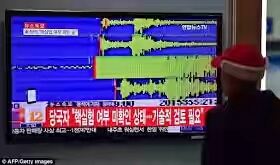North Korea yesterday conducted a ‘successful’ hydrogen bomb test, Pyongyang has confirmed.
The detonation of the thermonuclear weapon triggered a 5.1 magnitude earthquake when it exploded at 10am local time at the Punggye-ri test site in the north east of the country, the tremors of which were felt many miles away.
Its ignition ends weeks of speculation that leader Kim Jong-Un had developed such a weapon, which is lighter yet even more powerful than the fission blast generated by nuclear bombs containing uranium or plutonium alone.
‘The republic’s first hydrogen bomb test has been successfully performed at 10am on January 6, 2016, based on the strategic determination of the Workers’ Party,’ a state television news reader announced five-and-a-half hours after the blast.
Reading a typically propaganda-heavy statement, the anchor confirmed that a ‘miniaturised’ hydrogen bomb had been detonated in an operation that was deemed a ‘perfect success’.
She added that in doing so, North Korea ‘joined the rank of advanced nuclear states’ and had elevated their ‘nuclear might to the next level’, providing a weapon to defend against the United States – who they claim to have ‘numerous and humongous nuclear weapons’ – and its other enemies.
The broadcast concluded by saying: ‘If there is no invasion on our sovereignty we will not use nuclear weapon. This H-bomb test brings us to a higher level of nuclear power.’
The successful detonation marks a major step in North Korea’s nuclear development and is bound to cause considerable anxiety to neighbouring countries.
Last month, Kim Jong-Un had suggested Pyongyang had already developed a hydrogen bomb – although the claim was greeted with scepticism by international experts.
Daily Mail/AP




